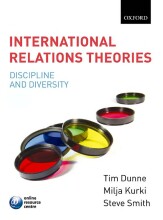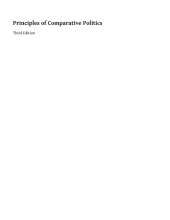Normative International Relations Theory - Book chapter Erskine
24 important questions on Normative International Relations Theory - Book chapter Erskine
What is the simple aim of Normative International Relations Theory, according to the Erskine chapter in the book?
There are 2 accounts of the history of Normative International Relations Theory, what are these perspectives?
- A young and immature theory developed during the international problems in the 1960s and 1970s (Vietnam war) that drew focus on practical questions in world politics and was the awakening of the just war tradition + Rawls Theory of Justice;
- The theory finds its roots in the works of Marx, Hegel, and Plato.
Both perspectives are correct since they both highlight different aspects of the theory.
What are the 2 radically different accounts of the moral significance of identities in Normative International Relations Theory?
- Higher grades + faster learning
- Never study anything twice
- 100% sure, 100% understanding
What are the 2 different meanings of cosmopolitanism in Normative International Relations Theory and what do they entail?
- Political cosmopolitanism: elimination of state borders to achieve some kind of world governance;
- Ethical cosmopolitanism: a global sphere of equal moral standing, everyone matters equally. (center of attention in Normative IR Theory)
What concept do both political and ethical cosmopolitanism use and what is the difference in meaning?
Political cosmopolitanism uses the concept quite practically as there are no state borders and thus a world society.
Ethical cosmopolitanism uses the concept world citizen because we are all equal thus the same morally.
What could be identified as a concern of ethical cosmopolitanism?
What does the concept communitarianism entail in Normative IR Theory? What does it define, according to MacIntyre?
What weaknesses of a communitarianist perspective could be identified?
There are two different types of normative theory that provide moral frameworks on what we should do. What are these?
What does consequentialism in Normative International Relations Theory entail?
What are 2 common criticisms on consequentialism?
- That anything could be permitted or unacceptable based on its projected consequences;
- It is very demanding and takes time to find out what consequences are.
The proportionality principle is part of consequentialism. What does the proportionality principle entail?
What does deontology in Normative International Relations Theory entail?
What is a common criticism on deontology?
An answer to this problem of deontology comes from the Doctrine of Double Effect. What does the DDE in Normative IR Theory entail?
What are the 3 insights of Normative IR Theory?
- Norms matter in world politics;
- Sites of value affect issues of inclusion;
- The global realm is one of moral agents and these agents have moral responsibilities.
What are international moral norms in the eyes of a Normative IR theorist?
There are two positions within the sites of value that affect moral inclusion. Which 2?
- Ethical particularism;
- Ethical universalism.
What does the position of ethical particularism entail and what type of moral framework in Normative IR Theory belongs to this position?
What does the position of ethical universalism entail and what type of moral framework in Normative IR Theory belongs to this position?
Why is the global realm one of moral agents and moral responsibilities?
What are the 2 senses of the relationship between moral agents and moral responsibility in the global realm in Normative IR Theory and what do they entail?
- Forward-looking sense: associated with claims to duty and obligation, in terms of acts that ought to be performed;
- Backward-looking sense: accountability and blame/praise for acts and omissions.
What does the Just War Tradition in Normative IR Theory entail?
What are the 2 categories of principles of restraint in the just war tradition?
- Jus ad bellum: governing the justice of resorting to war.
- Jus in bello, pertaining to just behaviour in war. (deontological)
The question on the page originate from the summary of the following study material:
- A unique study and practice tool
- Never study anything twice again
- Get the grades you hope for
- 100% sure, 100% understanding































